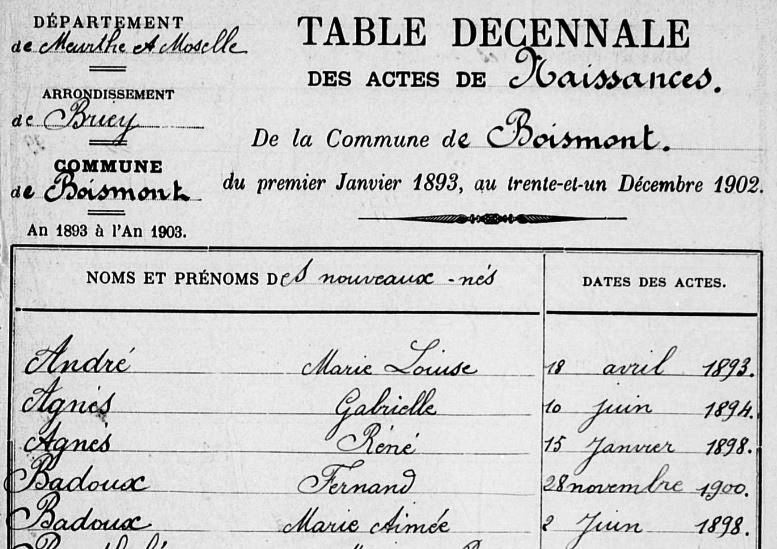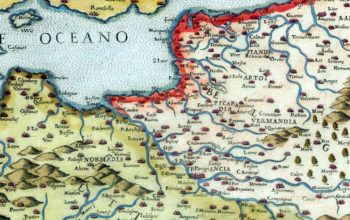Finding your ancestors in France: where to start
When you want to build a family tree with French ancestors, the place to start is almost always civil registration or parish records. They are the most reliable records, and most of them are accessible online.
If you know the place and date
If you know the date and place of birth of your French ancestor, you should start by looking for his birth record. You will find it in different types of archives depending on the date:
- for a birth after 1900 or 1910, the records will rarely be online. Most of the time you will have to write to the town’s city hall (mairie) to get a copy of the birth certificate;
- for a birth between 1793 and the 1900s, the birth will have been recorded in civil registration (état civil) and you will be able to find it online for almost any place in France;
- for a birth before 1793, you should look for a baptismal record in parish records (registres paroissiaux). There was no civil registration yet: all births were recorded only by the parish. Most of these records can also be found online.
Note that most parish records start around the end of the 17th century. Sometimes, you can go a little further but many records have been lost before this time.
Civil registration and parish records are both kept by departmental archives (Archives Départementales). Most of these records have been digitized and can now be found online, except for some rare départements.
To find online records for your ancestor’s hometown, you will have to start by finding out in which department this town was (Wikipedia will be helpful for that). Then you will have to look for the website of this department’s archives. You can find a list of French archives websites on my French blog, here.
In each department, the records are organized by town. Most of the time, you will find a search form which will enable you to look for a town and a date (or a period), and then access the records.
If you know the place but not the date
If you know the place but not the exact date of an event in the 19th or 20th century, you can also use the tables décennales: tables which sum up all births, deaths and weddings in alphabetical order for a 10-year period for each town.
These tables appeared only with civil registration, i.e. in 1793. This is why tables cover a ten-year period starting in a year ending with three (for example, the table shown above covers the years from 1893 to 1902). These tables have been digitized along with civil registration.
Most of the time there are no such tables for parish records in the 18th century or before. However, sometimes, you can find alphabetical or chronological tables for parish records. This is particularly helpful for big cities. If they exist, these tables will have been digitized along with parish records.
Otherwise, the best option is to read all the records for a given period.
If you do not feel like reading the records (or if you have difficulties understanding the handwriting), you can also use the websites presented below.
And what if you do not know the place?
When you do not know the exact place of an event, doing research in France is always a bit difficult. This is why you should always start by searching as much information as possible on your ancestor in the country where he/she arrived.
For a long time, there was no website where you could find all archives from all départements. Filae (a private company) has started filling this void by concatenating and indexing 19th century records from all départements.
These indexed records can be very helpful if you are looking for a record for which you do not know the exact place and date. However, they are not complete: the focus has been put on the 19th century (from 1800 to 1900), and only for départements which already had online records (Moselle and Gard are still missing, for instance). But they are now starting to index parish records from the 18th century, so it should soon be more complete.
You can also find census records and various other records on this site. But all resources are not available there, so you should always go back to the Archives Départementales website to look for more information.
If you do not know the exact place and date of birth of your ancestor, another helpful website is Geneanet. It has a huge database of family trees, and various indexed records, uploaded by users. It is, by far, the most popular genealogy website in France. You should be able to find many clues for your research on this site. However, as it is based on online trees and data offered by users, there can be mistakes. So it is always better to go back to Archives Départementales website to look directly at the records.
Elise





I have used Geneanet with some good results but with Filae you don’t have an option of an English-language version (or at least I’m not aware of it). I have a language translation app, but it takes so long! I know that Genealogy takes hard work as I started before the internet!, But it’s frustrating.!!
To my knowledge, there is no English version of Filae. I understand that it can be frustrating to do genealogy research in France, when so many sites are only in French. This is one of the reasons I created this blog: to give keys to better understand French resources and websites.
Elise
How do I find the website of a specific department? All of my ancestors beginning in the 17th century were from Canada/Québec. Before that, most were from France. I have learned the likely dates and locations of their births from Ancestry.com, but know that this site is not totally accurate. So I would like to verify them through the French archives. Is there a website that will direct me to the site of each department? Of course, the departments did not exist in the 17th century, but the individual records that I have from the PRDH (Programme de recherche en démographie historique) provide both the original provinces and the present-day departments. So I just need to know how to find the websites.
Please forgive me for my previous question! I just found your page with the list of all the archives. I’m going to share it with my French Canadian Ancestors Facebook group. It is a very valuable resource for us.
What ever internet server you have it may have what Google. com has..an option to automatically translate in your language any sites that you go onto.
I used that to translate All French websites and a message comes up asking if I want it translated into English.
I have been using that for some time now.
As for researching older records “Vendee Department” has online records going back to 1680 and some before that. I located my ancestor, and yes I had to look through online French records written in old French but its easy ..just look for the names and dates, then I post it on Facebook French site and usually someone will translate word for word for me.( French Canadian Genealogy site).
I was led to believe through research that my grandmother (now deceased) was born in Paris – a very kind individidual who used to work for the Paris Archives completed a search for me and found this not to be the case. According to Antwerp Police Immigration records these state my grandmother was born in Paris but since i have found this not to be case – i am at a loss as to what i can do to find her birth place in France – she was born in 1922, May. Any advice would be so hugely appreciated. Thankyou in advance.
Unfortunately, without a place of birth, the research can be quite complicated, as there are no indexed records for this period. You can try to look for her name in databases like Geneanet or Filae, but as it is quite recent, it might be difficult to find her… My advice would be to try to find as much information as possible in the places where she lived, and look for any clue, that might give you information about her place of birth.
I look for my ancestors du cote de ma maman
Ne Roudeix fille de Léonard Roudeix et de marie le page ne Yolande Roudeix le 4avril 1915 a plounez qui fait maintenant partie de Paimpol côtes d armor
Hello, you can find online archives for Plounez on the website of the Côtes d’Armor archives: https://archives.cotesdarmor.fr/registres-paroissiaux-et-d-etat-civil
Best regards
My great grandparents were born in Karaikal (Pondicheri) during French colonial rule in 1870, when I checked Karaikal Municipality they have no record of my grandparents. We need your information on how to check birth and death certificates for details prior to 1880.
Hello, you can find records for Karikal on the ANOM website (archives from the French colonial empire).
Elise, I have a copy of my great grandfather’s (Martin HIRIART Greciet, born in Ascain in 1852) birth certificate. Therefore I know his father and mother’s last name ( Jean Hiriart and Jeannette Greciet). I do not speak French. Can I hire someone to get birth certificates for Jean and Jeannette? I found Martin in ac1895 in a census in Argentina and manage to work back to his birth. Also he may have had an other siblings. His parents were married.
Hello, this is a research I could help you with. I am going to send you an email for more information.
I am trying to find two of my French husband’s relatives ie Grandfather and Aunt, Grandfather died in 1989 in Crosne, Essonne and Aunt not sure when she died either 2013 or 2004, I have tried searching online but not any luck, he has no relatives alive to ask for information. I just want to find their graves to pay our respects to them, I have tried to site Find A Grave but no use. Any advice would be so appreciated. Thank you.
Hello, you can try to search their names on this website where you can find information about people who died in France between 1970 and today. You can also search for their names on Geneanet or Filae to see if there is information about them.
HI good luck with your search lm about to start looking for any french ancestry l live in france but lm english Marie beaumont thursday 22/ 06/ 2024 have à good day
Hello,
Where would I find student rolls for boarding schools? My husband’s g grandmother appears as a nine month old in the 1881 census in Dieppe, Seine-Maritime and then disappears until she is 15 years old and living with her paternal grandmother in 1896 in Dieppe again after the death of her mother. I have tried all relatives in the Departmental archives for Dieppe and surrounding areas but have had no success. Can you help me with this?
Hello,
student rolls are not always easy to find, and they have not always been properly kept. For public schools, they could be found in the Departemental Archives of Seine-Maritime (but not online). For private schools, it depends: they can also be in the Departemental Archives or they could have been kept by the schools if they still exist.
I will be visiting LaRochelle this summer (2024) and would like to experience, as much as possible, the Era of time when the Huguenots fled in the mid-1650’s. My ancestor was born there about 1640, but sailed from the Isle of Jersey in 1665, on the ship “Phillipe”, with the newly appointed Governor Cartaret, to the New Jersey Colony.
Can someone recommend resources for my research? Eleanor Sandford